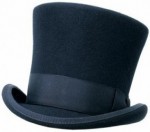High class presidents – Lech L’cha
 I had a childhood ambition to be a synagogue president. In the event I became a rabbi: I don’t know whether I did better or worse.
I had a childhood ambition to be a synagogue president. In the event I became a rabbi: I don’t know whether I did better or worse.
What attracted me to lay leadership was not merely that in my synagogue the ways of old Anglo-Jewry ruled, and the president, like his counterparts in pre-war continental communities, wore a top hat and other finery.
I was also impressed that the president was a person of evident importance and tended to be a communal grandee from one of the leading families with an inherited sense of service.
Jewish communities had their aristocracy – some actually held noble titles such as “The Honorable”, “Sir” or “Lord” – and you could hardly be a president unless you had a touch of class.
In those days I did not realise that some or many presidents were not particularly religiously observant or knowledgeable: the criterion was whether a person would lend the post appropriate lustre and distinction.
Now if you have read thus far you will have every right to ask what this has to do with the portion of the Torah we read this week. There has to be a connection or else I would not impose my personal memories on you.
The answer is that in Parashat Lech L’cha we meet the very first Jewish leader, Avraham Avinu. Though he had a fine background, he was not so much a descendant as an ancestor. He did not wear a top hat (such things had not been invented) but he carried an air of distinction.
However, unlike the synagogue presidents of my childhood he brought other people under the wings of the Divine Presence. His leadership career was dedicated to sharing his love of God with everyone he met.
These days, synagogue presidents are much more in the Avraham mould than they ever were when I was young. I can forgive the fact that I hardly see top hats any more.



